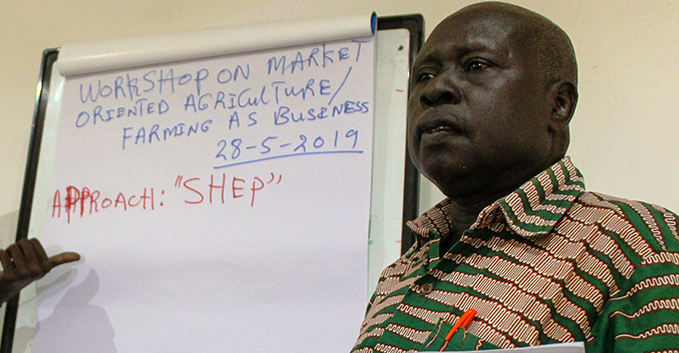Several extension officers and farmers benefited from smallholder horticulture training conducted in South Sudan’s Wau State last month.
The training, held from May 28-30, was organized by the International Organization for Migration (IOM) and Japan International Cooperation Agency (JICA), to strengthen the agricultural sector.
The initiative, held under the Smallholder Horticulture Empowerment and Promotion (SHEP) project, encourages small-scale farmers to conduct market-oriented agriculture to improve their livelihoods.
The Director General in the state Ministry of Agriculture, Joseph Richard, said agriculture is the major means of livelihood for communities in the region.
“I know this training will build the capacity of farmers on market-oriented agriculture as they cultivate for own consumption,” he said.
Kaoi Nakasa, IOM’s Transition and Recovery Project Manager said discussions between JICA and IOM to expand the SHEP approach to Wau begun in February 2019.
“It is my pleasure that we finally came to the day of the training as the first step to support the people in the region to re-establish and improve their lives after the years of crisis,” said Nakasa.
“I trust the bond between all the partners during the three days training will be the basis to further expand this project to other farmers in the region and transform their lives,” she added.
In 2015, JICA started working with the Jubek State Ministry of Agriculture to promote SHEP approach in the capital, Juba, according to it chief representative in South Sudan, Shinya Tomonari.
He said it is the first time the project is being implemented outside Juba.
“By working together with IOM and promoting SHEP approach, JICA aims to facilitate and strengthen resilience building and humanitarian-development nexus,” said Tomonari.
He added, “As a result, some farmers in Juba successfully harvested increased quantities of vegetables and improved livelihoods”.
In most communities, it is believed agriculture plays a vital role in helping communities build resilience as well as fight malnutrition.
Despite the huge agricultural potential South Sudan possesses, only about 5 percent of its arable land is reportedly cultivated.




